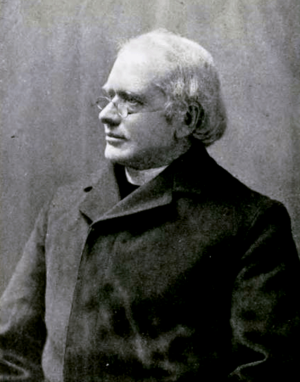Peadar Ua Laoghaire facts for kids
Father Peadar Ua Laoghaire (pronounced 'Pya-dar O Lay-ra'), also known as Peter O'Leary, was an important Irish writer and Catholic priest. He was born on April 30, 1839, and passed away on March 21, 1920. Many people see him as one of the key figures who helped create modern literature in the Irish language.
Contents
Meet Peadar Ua Laoghaire
His Early Life and Becoming a Priest
Peadar Ua Laoghaire was born in a place called Liscarrigane in County Cork, Ireland. He grew up speaking Munster Irish, which is a dialect of the Irish language. His home area, Muskerry, was part of a Gaeltacht. A Gaeltacht is a region where Irish is still the main language spoken by people every day.
He went to St Patrick's College, Maynooth, a famous college for priests. In 1867, he became a priest in the Roman Catholic Church. Later, in 1891, he became a parish priest in a town called Castlelyons.
His Famous Stories and Books
It was in Castlelyons that Peadar Ua Laoghaire wrote his most famous story, Séadna. He first told this story around a fireplace to three young girls. Séadna was a very important book for the Gaelic revival. The Gaelic revival was a time when people worked hard to bring back the Irish language and culture.
The story of Séadna is about a shoemaker who makes a deal with "the Dark Man." It's a bit like the old German legend of Faust, where someone makes a deal with the devil. The story was first printed in parts in a magazine called the Gaelic Journal starting in 1894. It was then published as a full book in 1904.
Besides Séadna, Peadar Ua Laoghaire also wrote a book about his own life called Mo Sgéal Féin, which means "My Own Story." He also translated some old Irish stories into modern Irish. He even translated a shorter version of the famous Spanish book Don Quixote into his local Irish dialect.
His Ideas About the Irish Language
Peadar Ua Laoghaire was well-known for supporting what he called caint na ndaoine. This means "the speech of the people." He believed that the real, everyday Irish spoken by people was more important than trying to bring back older, more difficult forms of the language.
However, he also thought there was a difference between good Irish and not-so-good Irish. He believed that clear and strong ways of speaking made the language better. He felt that some ways of speaking Irish were becoming too loose, like English, which he thought had "fallen apart completely." Because of this, he strongly promoted the Cork dialect of Irish. He believed it was the best form of the language for everyone in Ireland to learn and use.
Peadar Ua Laoghaire passed away in Castlelyons when he was 80 years old.
His Many Writings
Peadar Ua Laoghaire wrote many books and articles. Here are some of his works:
- Ar nDóithin Araon, 1894
- Mion-chaint, an easy Irish phrase book, 1899
- Aesop a Tháinig go hÉirinn, 1903 (Aesop's Fables in Irish)
- Séadna, 1904
- An Craos-Deamhan, 1905
- An Bealach Buidhe, a play, 1906
- Tóruigheacht Dhiarmuda agus Ghráinne, 1906
- Niamh 1907
- Eisirt, 1909
- An sprid: Bas Dalláin: Tadhg Saor, three short plays, 1911
- An Cleasaidhe, 1913
- Caitilina, 1913
- Aithris ar Chríost, 1914 (a translation of 'Imitatio Christi')
- Lughaidh Mac Con, 1914
- Bricriu, 1915
- Mo Sgéal Féin, 1915 (his autobiography)
- Don Cíchóté, 1921 (a partial translation of Don Quixote)
- Sgéalaidheachta as an mBíobla naomhtha, 1924 (stories from the Bible)
A list showing 487 of his articles and works was published in a magazine called Celtica in 1954.
See also
 | Charles R. Drew |
 | Benjamin Banneker |
 | Jane C. Wright |
 | Roger Arliner Young |


